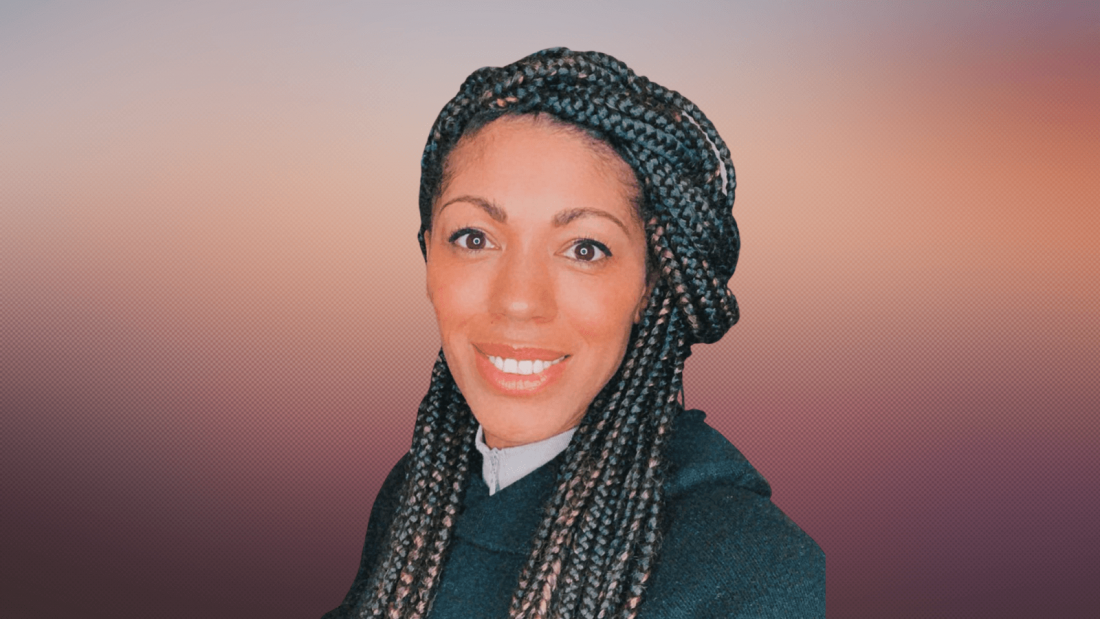Dr Zoe Williams takes time out of her busy schedule to dispel some of the most common rumours and myths about the COVID-19 vaccines and highlights the facts that you really ought to know.

Credit: from Dr Zoe’s Instagram
Understandably, there is hesitation within some areas of the Black community when it comes to whether or not they will take the COVID-19 vaccine for various reasons. It’s not surprising, when research shows that Black and Asian people have been disproportionately affected by the virus.
In the absence of clear, simple guidance, it’s common for myths and rumours to fill the void and that’s exactly what’s happened with the COVID-19 vaccines.
NHS GP (general practitioner) and media medic Dr Zoe Williams has stepped up once again to offer the facts and dispel the fiction about a burning medical issue through her popular Instagram page.
“At the end of the day, it’s completely your choice…”
Dr Zoe, who has even completed the training to administer the vaccine herself, answered several questions about the COVID-19 vaccines. It’s hardly surprising that people have rushed at the opportunity to submit questions for Dr Zoe to answer. After all, the COVID-19 virus is less than one year old and the vaccines were developed, tested and rolled out very quickly in comparison to other vaccines. Despite this, immunologists (scientists and clinicians who specialise in vaccines and immunology) have deemed the virus safe for humans and Dr Zoe tells us why any concerns should be short lived and why the vaccine will do more good than harm.
Read on for Dr Zoe’s answers to some of the most burning questions about the COVID-19 vaccines.
View this post on Instagram
Might sound silly, but rumours about it affecting fertility [are they true]?
Not a silly question at all and lots of people actually asking about fertility! Now I’m not completely sure where these rumours around the vaccine affecting fertility have come from. I know that having COVID-19 can affect fertility. There have been reported cases of men, young men as well who have fully functioning sperm, but after COVID-19 infection it’s affected their sperm. In the cases I’ve heard of its recovering as well, so thought to be a temporary thing.
But for the COVID vaccines, there’s no evidence as far as I’m aware that suggests that it should affect fertility. There’s no real rationale or scientific reason why that is the case, but it just shows how dangerous it is when a rumour or a bit of fake news starts somewhere.
If you have had COVID should you get vaccinated?
Yes, because having had COVID doesn’t necessarily mean you are immune for life, we don’t know that yet and the vaccine is likely to support whatever immunity you do have.
I’ve seen a few scare mongering posts on FB (Facebook) about people who have died since [taking the vaccine]
Yep, me too and scare mongering they are! I had a conversation with a friend about this the other day because she was concerned, because she heard of five reports of people dying shortly after having the vaccine. In none of those cases has it been show that they died because of the vaccine, though it is really important that they are investigated.
If you were to take 50 million fit healthy people in a study and leave them alone, sadly in the week following that a very small number of people would die unexpectedly, from things like heart attacks, blood clots and infections. If we say that 50 million people have been vaccinated so far around the world with COVID vaccines and if five people have died shortly following that from unexpected things like heart attacks and blood clots, it’s not the vaccine. In fact, if 50 million people have received the COVID vaccine in the past few weeks and only five people have had unexpected deaths after that we can safely say that it’s not the vaccine, the vaccine is not killing people.
If you are allergic to penicillin can you have any of the vaccines?
There are no antibiotics at all or even traces of antibiotics at all in either of the two vaccines that are currently being used in the UK, so an antibiotics allergy is not a problem, you can still use the vaccine.
If immunocompromised what’s the take on having the vaccine?
Both vaccines are non-live vaccines so they can’t give you the actual infection so therefore people who are immunocompromised can safely go ahead and have the vaccine.
Do either of the vaccines contain eggs or egg products?
No egg or egg products! [You’ll be pleased to know the vaccine does not contain any animal products, so it is safe for vegans!]
Is it going to be like the flu vaccine where we have to have it yearly?
We don’t know yet, hopefully not, but as of yet we don’t know.
What’s your view on the likelihood of carrying/passing on COVID-19 even once vaccinated?
This is an important one and again this is an unknown, so the research that has been done so far has really looked into protecting somebody from COVID-19 by vaccinating them and there’s less data on transmission [spreading the virus] available at this time. Of course, it’s something they will look into and of course, the hope is that being vaccinated also means that you are less likely to transmit the virus. Until we know that it’s really important that everybody assumes that being vaccinated does not mean that you will not transmit the virus. Even if you’ve had both vaccines, you’ve completed the course, you know you are quite well protected from the illness we need to assume you can still pass it.
Does the vaccine prevent you from catching COVID? Or simply lessen the severity of symptoms?
This is the question. When the virus gets into your body your immune system jumps on it and attacks it and eliminates it pretty quickly. I think one of the most reassuring things that is coming out of these studies is so far with the vaccines that are available in the UK, although some people still got COVID-19 which is why when they talk about effectiveness [of the vaccine] they’re not 100%; but when it comes to the number of people who required hospital treatment because of COVID-19 or who died, nobody did. It [the COVID-19 vaccine] is 100% effective at protecting people from requiring hospitalisation or from dying from COVID-19. That’s pretty incredible, especially if we think about what’s happening at the moment with the number of people in hospital and the number of people who are dying every day, so no vaccine is 100% effective at preventing disease, but these trials are showing that the COVID-19 vaccines are highly effective at preventing disease, but extremely effective at reducing or eliminating (so far in the trials anyway) severe disease.
Can you catch COVID-19 from the vaccine?
The vaccine does not cause infection, it’s impossible. It can’t do it, but it might be that coronavirus you experience or come into contact with after that still causes an infection, but it’s very mild.
Do you think us pregnant [or breastfeeding] women will ever get to get it?
The first thing to clarify is that being pregnant doesn’t put you into the category one, (the people who are deemed the highest priority for getting the vaccine). It’s different with flu, being pregnant puts you at higher risk of getting flu, so when the flu vaccine is offered free every year, being pregnant puts you into that group that gets it for free. That’s not the case for the COVID vaccine, so being pregnant by itself doesn’t mean that you are eligible for the vaccine yet, but of course as the vaccine becomes recommended for other people later on then it may be accessible to you.
For people who are currently eligible for the vaccine for another reason who are also pregnant, so that’s health care workers, social care workers and those who have an underlying health condition, assuming that people are unlikely to be pregnant over the age of 65. That’s the group of people for whom this becomes a question for whether to have the vaccine or not have the vaccine and that decision should be made on an individual basis for each of those individuals.
Now what are the reasons it just isn’t offered to every health care worker for example who’s pregnant?
Well, the reason why not is that the trials that have gone on have not included pregnant women, so pregnant women are not represented in those trials, so therefore one argument is that you can’t say for certain that it’s safe in pregnancy because it hasn’t been tested. The other side of the argument is that it’s a non-live vaccine and we know that non-live vaccines, every other non-live vaccine is safe in pregnancy, so there isn’t really a good scientific argument or a good scientific hypothesis as to why this COVID-19 vaccine would be harmful in pregnancy. It’s probably not harmful, almost definitely not harmful, but it hasn’t been tested.
What it boils down to is for any pregnant woman or breastfeeding woman who is eligible for the vaccine, she needs to weigh up the pros and cons or the risks and benefits for her. Things that are going to come into that would be for example, say you work in a really busy A&E department and you have severe asthma, you’re probably more likely to think the benefits of having the vaccine in my case are quite significant and I know that there might not be a risk, that potential risk is very small. If for example you’re a GP like myself and you’re doing 90% of your consultations over the phone and actually using really good quality PPE when you are seeing patients and you don’t have any underlying health conditions, you’re fit and well. Then you might think well the benefits of the vaccine to me are not as great; especially if you’ve already had COVID-19 in the past that might be another factor.
The only person who can make that decision at the end of the day once you feel fully armed with all of the information is you as the individual, so it’s a lot of information and a really good resource is the RCOG website (Royal College of Obstetricians and Gynaecologists).
Can children be vaccinated?
A bit like with pregnant women the trials have not looked at vaccinating children, so there isn’t good data and evidence to give us absolute confirmation that the vaccine is safe in children, although you know it’s highly likely that it is. At the moment the two reasons why children aren’t on the vaccination programme, is one because the research hasn’t been done and also two because what’s always been kind of the silver lining of this horrible virus, this awful pandemic, is that it tends to leave children pretty much unescaped. [Which is] another reason why they’re not currently being vaccinated or have not been as highly as prioritised in the research as people who are more vulnerable.
I appreciate the priority list of those most vulnerable, but [when will young and healthy people be vaccinated?]
Yes of course the priority list is really important, but of course the aim eventually is to vaccinate as many people as possible. Assuming that you don’t work as a health care professional, you don’t have underlying health conditions; it’s going to be late summer according to the omni-calculator. You can go there and put in your own details and find out an estimate, that’s assuming that a million people a week are vaccinated and about 70% of people do take the opportunity to have the vaccine.
What would I say to people who are being offered the vaccine?
At the end of the day, it’s completely your choice and I would never try and encourage you or sway you, but I genuinely can’t give you a good reason why not to have the vaccine if it’s offered to you unless you have an allergy or unless you’re pregnant or breastfeeding, so therefore takes a little more weighing up of the risks and benefits.
View more Q&As on the COVID-19 vaccine in Dr Zoe’s Insta Story highlights on her instagram page.












